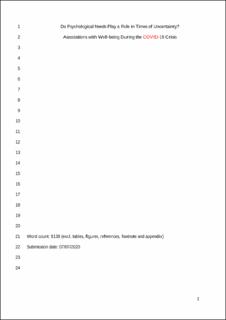| dc.description.abstract | Across the world, measures were taken to contain the spreading of the COVID-19 virus. Many of these measures caused a sudden rupture in people’s daily routines, thereby eliciting considerable uncertainty and potentially also hampering the satisfaction of individuals’ psychological needs for autonomy, relatedness, and competence. Drawing upon Maslow’s Hierarchical Need Theory and Self-Determination Theory, this study examined the unique role of felt insecurity and the psychological needs, as well as their dynamic interplay, in the prediction of mental health. A large and heterogeneous sample of adults (N = 5118; Mage = 43.45 years) was collected during the first ten days of the lockdown period in Flanders, Belgium. A subsample (N = 835, Mage = 41.39) participated during a second wave one week later. Hierarchical regression analyses indicated that felt insecurity, need satisfaction and need frustration all independently predicted various positive (life satisfaction, sleep quality) and negative indicators depressive symptoms, anxiety) of mental health, with little systematic evidence for interactions between the predictors. The pattern of findings obtained concurrently largely held in the longitudinal analyses. Finally, results showed that associations between felt insecurity and lower concurrent and prospective mental health were partially mediated by need satisfaction and frustration, with especially psychological need frustration predicting changes in mental health over time. Overall, the findings suggest that satisfaction of the psychological needs for autonomy, competence, and relatedness is not just a ‘luxury good’. Satisfaction of these needs is important also in times of insecurity, while need frustration represents a risk factor for maladjustment during such times. | en_US |
